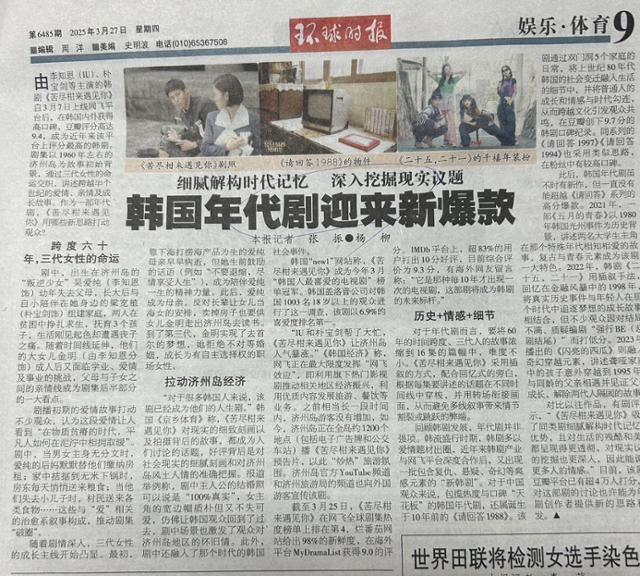
A scene from "When Life Gives You Tangerines" / Courtesy of Netflix
The Global Times, a Chinese Communist Party-affiliated newspaper known for its nationalistic stance, has surprised many by praising the Korean drama "When Life Gives You Tangerines." The paper is typically known for provocative coverage that fuels tensions with Korea, including claims that kimchi and "hanbok" originated in China.
On Thursday, the Global Times published an article titled "A new hit emerges among Korean period dramas," highlighting that "When Life Gives You Tangerines," starring IU and Park Bo-gum, has received widespread acclaim both in Korea and abroad since its Netflix release on March 7.
It noted that the show earned a 9.4 rating on DouBan, a Chinese review platform, making it the highest-rated Korean drama on the site in recent years.
The paper's unexpected shift in tone has sparked speculation that it could indicate a loosening of China's "Korean wave ban," also referred to as the "hallyu ban."
The Global Times explored the factors behind the drama's success, drawing comparisons to another popular Korean series, "Reply."
The paper noted that while Korean shows have traditionally excelled in the romance genre, recent collaborations with Netflix have allowed them to explore new genres and themes.
It highlighted how the integration of Korea's societal changes into everyday life helped evoke empathy from viewers, especially through the lens of ordinary characters.
The nostalgic drama spans over 60 years in the lives of its main couple on the southern island of Jeju: Ae-sun, a spirited rebel portrayed by IU and Moon So-ri, and the steadfast Gwan-sik, played by Park Bo-gum and Park Hae-joon, with the latter actors portraying their older selves.
Rare praise sparks speculation
The rare praise is drawing attention, given the paper's history of downplaying or distorting Korean culture, including K-pop.
In 2020, the Global Times strongly criticized BTS after the group received the James A. Van Fleet Award from a U.S. nonprofit foundation and referenced the shared sacrifices of Korea and the United States during the Korean War, arguing that it "harmed China's dignity." Such incidents have contributed to the paper's reputation for antagonistic coverage of Korea.
Observers in Beijing suggest this unexpected shift in tone may be linked to ongoing efforts between the two countries to improve cultural exchanges.
During a bilateral meeting on March 21 in Tokyo, the foreign ministers of Korea and China agreed to restore cultural cooperation as part of strengthening ties.
Expanding cultural exchanges was also a key topic when National Assembly Speaker Woo Won-shik met with Chinese President Xi Jinping earlier this year.

Global Times analyzes success of Korean drama "When Life Gives You Tangerines." Captured from Global Times
Though China has long maintained that there is "no official ban" on Korean content, in practice it has heavily restricted the import and promotion of Korean content.
However, signs of a gradual opening up have emerged recently within Beijing's cultural scene. Moon Il-hyun, a professor at China University of Political Science and Law, said the Chinese government may now be trying to build justification for lifting what he described as an "invisible barrier."
He noted a state-run outlet prominently covering a Korean drama, not just a one-off film or concert, is a significant signal.
This apparent thaw is further evidenced by the upcoming Waterbomb Hainan 2025 festival, scheduled for April 12-13 in Hainan, southern China, featuring a lineup of K-pop stars including Jessi, Ailee, Jay Park, JIA, PH-1, Tablo, Tiger JK & Yoonmirae and former Girls' Generation member Jessica.
Although all are actively based in Korea, they hold foreign nationalities, mostly American, which may have allowed them to receive performance permits in China.
In addition, Bong Joon-ho's movie "Mickey 17," while not a Korean-produced or distributed film, is scheduled for theatrical release in China, fueling further speculation that the cultural restrictions may be easing.
This article from the Hankook Ilbo, the sister publication of The Korea Times, is translated by a generative AI system and edited by The Korea Times.
 Subscribe
Subscribe E-Paper
E-Paper